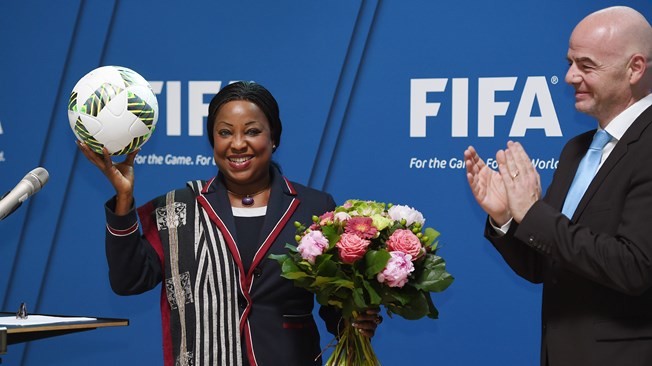DUBAI: At FIFA, long considered an old boys’ club with a locked door and glass floor, Fatma Samoura is the face of change.
In June 2016, when newly elected president Gianni Infantino appointed her as his secretary-general, it went some way in suggesting “reform” was more than just a cute campaign slogan. Samoura, a black Muslim woman, became not only the first non-European to hold FIFA’s second-most powerful position, but also the first female to sit at the organization’s top table.
The appointment was greeted with a mixture of satisfaction and cynicism. Supporters hailed the former UN employee as an outsider, a clean break from the previous regime and free of the stench of corruption. Critics, in contrast, noted her lack of sporting administrative experience and proclaimed the appointment as mere window dressing by Infantino.
To mark International Women’s Day, Arab News spoke exclusively to Samoura about her journey to becoming the most influential female in world football.
Fatma Samba Diouf Samoura was born in Dakar on Sept. 9, 1962, two years after Senegal declared independence from France. The former United Nations humanitarian co-ordinator acknowledges her parents laid the foundations for her to become the woman she is today.
“I was the second of seven children, but the only girl,” said Samoura, by phone from FIFA HQ in Zurich. “Traditionally in Senegal, because we are a Muslim society, they would not consider a woman’s education as a priority but in the case of my family it was totally the opposite.
“My parents were both well educated — my mother was a teacher and my father was in the military — and they invested in my education, ensuring I was not discriminated either by my brothers or society. They gave me all the tools and support for me to grow up with an independent mindset.”
Samoura moved to France shortly after graduating from high school and spent the next six years studying. She returned home aged 25 with a master’s degree in English and Spanish from the University of Lyon and a postgraduate degree in international relations and trade from Strasbourg’s business school.
For eight years, she worked for one of the largest fertilizer companies in the world. She married and now has three children, two boys and a girl.
“When I returned to Senegal, I occupied a position that was traditionally occupied by men, but I had the support of my boss, who was French and who had a very high opinion of Senegalese women. For this reason, I can say that from my childhood to the day I started working I have always been surrounded by supportive people who believe in female empowerment.”
Samoura joined the United Nations in 1995 and moved to Italy. Her job, however, would continually take her back to Africa as she worked to improve situations in places such as Chad, Madagascar, Darfur and Nigeria. It was in Madagascar during a World Cup 2018 qualifying game in November 2015 that she first met Infantino, who was reportedly immediately impressed. When the Swiss-Italian won the presidency four months later, she sent him an email. He called her, eventually offering her the job.
“I know there were other candidates,” said Samoura, who speaks French, English, Spanish, Italian and her native Wolof. “I cannot really say too much about the criteria for my appointment, but I think the fact that I was coming from a totally different background and yet had international experience was considered an asset. As for being a woman, I don’t feel any added pressure. Instead I see it as an opportunity. Already we can see FIFA is a more diverse, open and transparent organization than before and I am very proud to be leading this change.”
FIFA’s reforms include statutory obligations to promote and support women in football and a requirement of at least one female representative in each of the six confederations on the FIFA Council. A new Women’s Football Division dedicated to the development of the female game has also been created and is led by New Zealand’s Sarai Bareman, the only woman on FIFA’s 2016 Reform Committee.
Samoura, who went to school with the former Senegalese goalkeeper Cheikh Seck and whose uncle and husband are both former players, said: “Football is nothing new to me, I have been surrounded by it since I was six years old, but I am proud to see the changes we are making and the progress we are taking in regard to the women’s game.
“Throughout my life, I have always faced challenges as a woman in a traditional society or in a workplace dominated by men, but what has really taken me to where I am is hard work. I never expected anybody to do me a favor because I am a woman, and I still don’t.”
FIFA Secretary-General Fatma Samoura hails female empowerment

-
{{#bullets}}
- {{value}} {{/bullets}}
